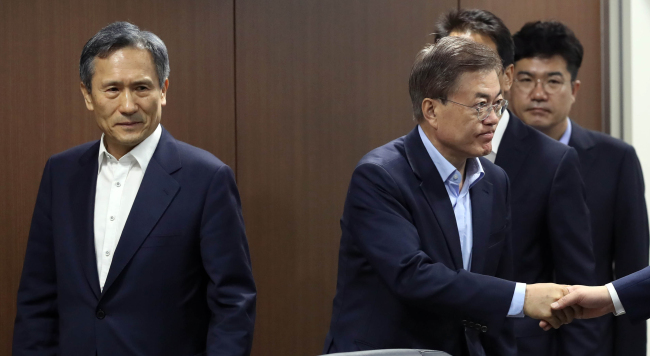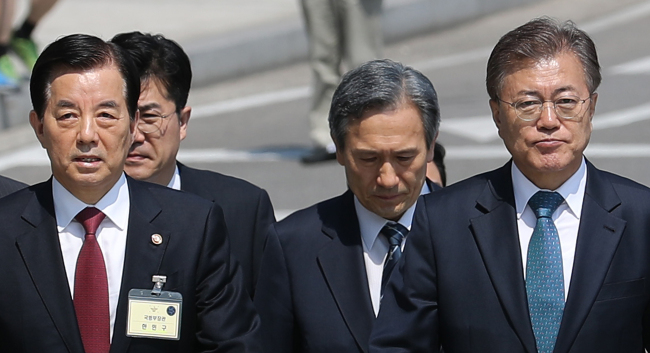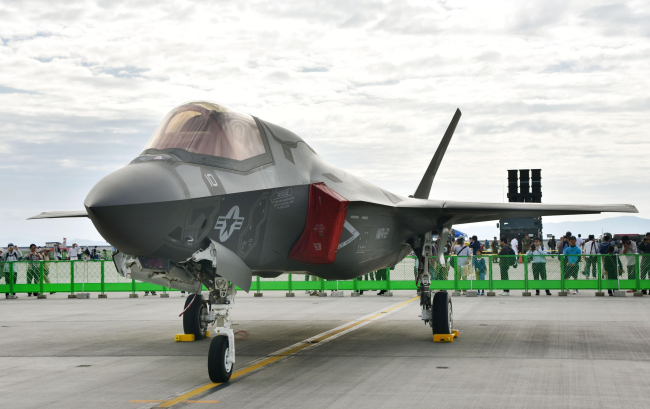[News Focus] Moon has more targets in military
THAAD omission gaffe to lay ground for sweeping military reform, corruption fight
By Yeo Jun-sukPublished : June 4, 2017 - 18:12
Former Cheong Wa Dae chief security officer Kim Kwan-jin and incumbent Defense Minister Han Min-koo -- a once powerful pair in South Korea's military hierarcy -- are under investigation for not relaying highly sensitive information to the new administration.
But the issue is only the beginning of trouble for the country’s military brass.
President Moon looks set to push ahead with his ideas to reform the military and eradicate corruption -- in particular the dubious connections between the military procurement agency and arms vendors.
“We have to use (the ongoing THAAD scandal) as an opportunity to root out irregularities in military acquisition deals that have brought enormous disappointment to the people,” said Rep. Kim Young-ho of Moon’s governing Democratic Party who is a member of the parliamentary defense committee.

Topping the list of “irregularities” would be the previous Park Geun-hye administration’s controversial decision to purchase 40 F-35 stealth fighter jets from Lockheed Martin, as part of the country’s next-generation fighters procurement project.
Despite the fact that Boeing’s F-15 Silent Eagle had been initially selected as a sole candidate for the project, then Defense Minister Kim Kwan-jin, who held the final say over the procedure as a chairman of defense acquisition council, ordered a review of the biding process and selected F-35 in the end.
Since April, the nation’s Board of Audit and Inspection has been looking into allegations that Lockheed Martin failed to fulfill its agreement, part of the 7.3 trillion won F-35 deal, to transfer technology to South Korea so that it can build its indigenous aircrafts.
Another issue could be the collusion scandal surrounding Korea Aerospace Industries, South Korea’s sole aircraft manufacturer, which produces indigenous air fighters, including supersonic aircraft T-50.
In 2015, KAI was accused for creating a slush fund worth of 5.2 billion won ($460 million) and bribing military and political figures with gift vouchers. About one-third of the fund was allegedly used for lobbying efforts. KAI has denied the allegation.
Since taking office, President Moon has made eradicating corruption in military on his top priority, describing it as a “deep-rooted evil” that has plagued the country’s national security and readiness posture.
“We will never tolerate irregularities over defense acquisitions,” Lee Soo-hun, a member of Moon’s de facto transition team, said on May 25 after receiving a report from the Defense Acquisition and Procurement Agency.
“The issue is so import that we decided to have a (separate) briefing session…Over the past years, the military has found itself in the hot seat from a series of procurement scandals. Now is the time to find ways to fix past wrongdoings and ensure military discipline.”

The Moon administration is not the first government that sought to overhaul the scandal-ridden military procurement process, mostly dominated by a revolving door of the defense ministry, acquisition agency and military contractors.
In 2014, former President Park ordered a massive probe into dubious military contracts following public outrage over Navy salvage ship ”Tongyeong,“ which failed to participate in the rescue mission of the sunken Sewol ferry due to a malfunction.
But the malfunction turned out to be a result of the collusion between the Defense Acquisition and Procurement Agency and former Navy captain, who received 400 million won in kickbacks to introduce a local supplier to DAPA official in charge of acquiring the ship.
The investigation team revealed that collusive practices were pervasive in various procurement contracts, ranging from the purchase of basic gadgets like body armor and rifles to high-tech ones such as submarines and helicopters.
Most of the corruption in procurement took place when each military branch raised its requirement to the Joint Chiefs of Staff, which determine whether to approve the request and have DAPA carry out procurement, said defense officials.
”Every service chief has been so obsessed with their legacy. They tend to think of how many contracts were signed during their tenure as a measure to gauge their performance,“ an Air Force officer who worked for DAPA until last year said under the condition of anonymity due to the sensitivity of the issue.
The majority of unlawful deals are made when the military signs a contract with domestic contractors, who supply the military with maintenance and upgrade components, not the foreign contractors such as the US government, who provide the whole weapon system under the restricted rule.
According to the Park administration‘s 2014 investigation on the collusion in military procurement, the Navy topped the list for engaging in wrongdoings, with a total amount of illegal projects amounting to 840 billion won ($750 million).
The reason is, acquisition officials and experts said, that the Navy’s procurement was mostly about purchasing components from domestic suppliers for maintaining and outfitting the warships, which suffered from frequent malfunctions during the operation.
President Moon vowed to impose harsh punishment on those involved with procurement irregularities. On the campaign trail, Moon said that corrupted officials will face punishment equivalent to a treason charge and contractors would be permanently barred from bidding processes if they are found guilty of wrongdoings.

”If anyone were found to have engaged in acquisition collusion, they would face severe punishment equivalent to the punishment on treason,“ Moon said in April when he was a presidential candidate for the Democratic Party of Korea, which last year sought to enact a bill including a similar idea to Moon’s.
The president also vowed to enhance civilian oversight over the procurement process by granting more authority to economic branches and outside entities and encouraging more civilian participation in the government-led, procurement decision-making body.
DAPA would be transformed into a body with more transparency and expertise. Created in 2006, the agency has been under scrutiny for a lack of military expertise, civilian oversight and collusion from revolving doors between its officials and contractors with a DAPA background.
But too much control would lead to excessive regulation on the defense industry, one of the most lucrative export businesses for South Korea, analysts noted, warning against the possibility that the overhaul movement would be reduced to political bickering.
For example, former President Park’s extensive investigation was criticized as a stunt to dive the people away from the Sewol tragedy as most of prosecuted high-profile generals were found innocent including former Navy chief Hwang Ki-chul, who is now on the list for the next defense minister or DAPA chief.
“Procurement scandal is the result of a break-up in the cartel created decades ago between the government and defense industry,” said Yang Uk, senior research fellow at the Korea Security and Defense Forum. “To some extent, it was somewhat inevitable, taking place because of the change of the economy.”
“Therefore, the issue should be seen from a broader perspective. We have to view it as a part of the effort to overhaul the military policy as a whole. Otherwise, investigation into the scandal could be subject to a political witch hunt.”
By Yeo Jun-suk (jasonyeo@hearldcorp.com)





![[Herald Interview] 'Amid aging population, Korea to invite more young professionals from overseas'](http://res.heraldm.com/phpwas/restmb_idxmake.php?idx=644&simg=/content/image/2024/04/24/20240424050844_0.jpg&u=20240424200058)











![[KH Explains] Korean shipbuilding stocks rally: Real growth or bubble?](http://res.heraldm.com/phpwas/restmb_idxmake.php?idx=652&simg=/content/image/2024/04/25/20240425050656_0.jpg&u=)

